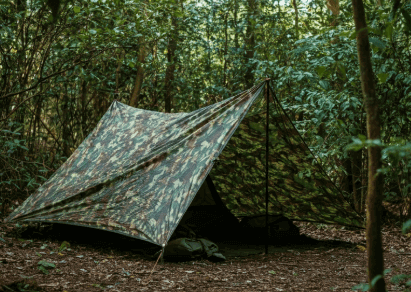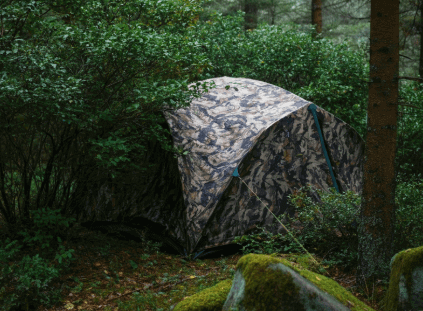Have you ever wondered, “What is Stealth Camping?” This thrilling and unconventional approach to camping involves setting up your shelter and sleeping overnight in an area not typically designated for camping, all while remaining undetected. For the adventurous soul, stealth camping offers an exciting way to connect with nature, away from crowded campsites and well-trodden paths. Whether you seek solitude in the wilderness or want to add an element of adventure to your outdoor experiences, understanding what is stealth camping can open up a world of hidden gems and secret spots waiting to be discovered.
Real estate investors Steve Daria and Joleigh have found that their passion for stealth camping fuels their adventurous spirits and gives them unique perspectives on potential investment properties. They gain valuable insights into the surrounding environment and community by exploring hidden locations and undiscovered terrains. Their stealth camping escapades often lead them to uncover exceptional plots of land that others might overlook, illustrating how adventure and business acumen can go hand-in-hand.
What is Stealth Camping?
What is stealth camping, exactly? Stealth camping involves setting up camp in an area not designated for camping and doing so in a way that minimizes your visibility and presence.
This practice often requires campers to choose discreet locations such as wooded areas, public lands, or even urban settings where camping is not explicitly permitted.
Unlike the usual camping, where you set up a tent in a designated campsite, stealth camping means blending into your surroundings and leaving no trace, making it essential to be quiet, avoid drawing attention, and pack out all trash.

Why Stealth Camp?
Understanding what is stealth camping offers the opportunity to immerse yourself in stunning, off-the-beaten-path locations, providing a deeper connection with nature.
This form of camping brings a thrilling sense of spontaneity and self-reliance as you navigate and adapt to the environment around you.
Additionally, it fosters a unique sense of solitude and peace, allowing you to escape the crowds and actually disconnect from the hustle and bustle of daily life.
Legal Considerations
Before diving into stealth camping, it’s crucial to understand the legalities.
While stealth camping can be thrilling, it can also be illegal in some places.
Always research local regulations and property laws before setting up camp.
Essential Gear for Stealth Camping
Explore tips for the essential gear for stealth camping:
Choosing the Right Tent
One of the most critical aspects of stealth camping is your choice of tent.
Opt for a tent that’s compact, lightweight, and easy to set up and take down.
Camouflage colors or neutral shades are ideal for blending into the environment.
Clothing and Accessories
Wear clothing that will help you blend into your surroundings.
Earth tones and natural colors work best. Avoid bright colors and reflective materials.
Additionally, invest in a good-quality sleeping bag and sleeping pad for comfort and insulation.
Tools and Gadgets
Pack essential tools like a multi-tool, flashlight, and portable stove.
These items will make your stealth camping experience more comfortable and convenient.
Remember to keep your gear minimal to maintain a low profile.
Get Started: Get Your Cash Offer Below…
We are direct land buyers. There are no commissions or fees and no obligation whatsoever. Start below by sharing where your property is and where we can send your offer…
Finding the Perfect Stealth Camping Spot
Understanding what is stealth camping and embarking on your stealth camping journey involves finding the perfect spot.
Research and Planning
Before heading out, spend time researching potential stealth camping spots.
Look for areas that are secluded, away from main roads, and offer natural cover.
Topographic maps and satellite imagery can be valuable tools for scouting locations.
Arriving at Your Spot
Plan to arrive at your chosen spot just before dusk.
This timing allows you to set up camp with enough light to see while minimizing the chances of being seen by others.
Remember to stay quiet and move discreetly.
Blending In
Once you’ve selected your spot, take extra precautions to blend in.
Use natural features like trees, bushes, and rocks to conceal your tent.
Avoid leaving any signs of your presence, such as trash or campfire remnants.

Strategies for Successful Stealth Camping
Here are strategies to help you further understand “What is stealth camping?” and how to do it successfully.
Leave No Trace
Leaving no trace in stealth camping is paramount for conserving the natural beauty of wilderness areas.
By meticulously packing out all trash, including micro-trash like food scraps and small items, you prevent environmental degradation and potential harm to wildlife.
Additionally, avoiding damage to vegetation and minimizing human presence ensures that future campers can enjoy the same pristine conditions, maintaining the allure and sustainability of these remote locations.
Stay Low-Key
In stealth camping, blending into your surroundings is crucial to maintaining the secrecy and integrity of your campsite.
Keeping noise levels low helps you remain undetected by minimizing your presence in the natural environment and avoiding disturbance to wildlife.
Using subdued lighting and refraining from loud activities further ensures that you respect the serenity of the wilderness, enhancing your overall experience of solitude and connection with nature.
Emergency Preparedness
Being prepared for unexpected circumstances is fundamental in stealth camping.
Carrying a well-stocked first-aid kit enables you to handle minor injuries promptly while having extra food and water ensures you can sustain yourself in case of unexpected delays or emergencies.
Additionally, a reliable means of communication, such as a satellite phone or personal locator beacon, provides a lifeline in situations where you may need assistance, ensuring you can navigate challenges safely and confidently while exploring remote areas.
Tips and Tricks for Stealth Camping
Discover the tips and tricks for stealth camping.
Packing Efficiently
In stealth camping, the principle of packing efficiently is essential for mobility and discretion.
Selecting lightweight, compact gear ensures you can move swiftly and quietly through various terrains without being encumbered by unnecessary weight.
Prioritize multi-functional items that serve multiple purposes to minimize the number of items you need to carry, thereby enhancing your ability to remain agile and unnoticed in remote locations.
Less is More
By embracing a minimalist approach, you reduce the risk of drawing attention to your campsite and increase your ability to blend into natural surroundings seamlessly.
Avoiding bulky or noisy equipment allows you to maintain a low profile and maneuver through dense foliage or rugged terrain with ease.
This minimalist mindset not only supports stealth camping principles but also fosters a deeper connection with nature by encouraging a focus on essential experiences rather than material possessions.
Setting Up and Taking Down Camp
Practice setting up and taking down your tent quickly and efficiently.
The faster you can set up and break camp, the better your chances of remaining unnoticed.
Handling Encounters
If you encounter other people while stealth camping, remain calm and friendly.
Explain that you’re just passing through and mean no harm.
Most people will respect your intentions and leave you be.
Conclusion
Stealth camping is an exciting and rewarding way to connect with nature and experience the outdoors uniquely. By understanding what is stealth camping, you can enjoy the thrill of it while minimizing your impact on the environment and respecting legal boundaries.
Ready to start your stealth camping adventure? Gather your gear, plan your route, and immerse yourself in the beauty of nature like never before. Happy camping!
**NOTICE: Please note that the content presented in this post is intended solely for informational and educational purposes. It should not be construed as legal or financial advice or relied upon as a replacement for consultation with a qualified attorney or CPA. For specific guidance on legal or financial matters, readers are encouraged to seek professional assistance from an attorney, CPA, or other appropriate professional regarding the subject matter.
